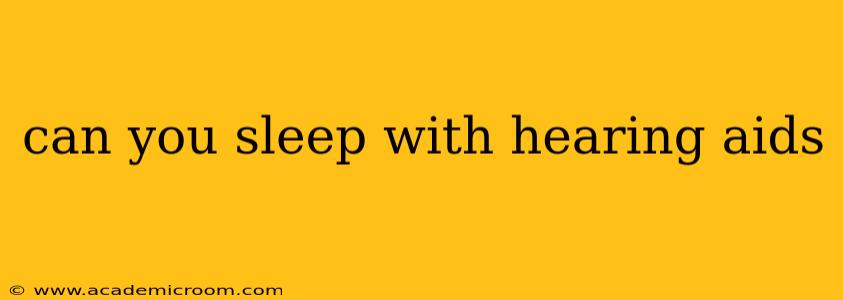Can You Sleep With Hearing Aids? A Comprehensive Guide
Many people wonder whether it's safe or advisable to sleep with their hearing aids. The answer, like many things in life, is: it depends. There's no universal yes or no. This guide will explore the factors influencing this decision and provide you with the information you need to make the best choice for yourself and your hearing aids.
What are the potential risks of sleeping with hearing aids?
This is a crucial question, and the potential risks are the primary reason many audiologists advise against it. The risks include:
- Damage to the hearing aid: Sleeping with hearing aids can expose them to sweat, oils, and pressure, potentially leading to malfunction or damage. This is especially true for more delicate, behind-the-ear (BTE) or in-the-ear (ITE) styles. Accidental breakage from rolling over on them is also a possibility.
- Earwax buildup: Sleeping with hearing aids can increase earwax buildup, which can obstruct sound and lead to infections or further hearing aid damage.
- Irritation and discomfort: The constant pressure and friction from a hearing aid against your ear canal while you sleep can lead to irritation, discomfort, and even skin infections.
- Loss of hearing aids: A smaller, more easily misplaced hearing aid could be lost during the night.
What types of hearing aids are less suitable for sleeping with?
Certain hearing aid types are inherently more vulnerable to damage or discomfort during sleep:
- Behind-the-ear (BTE) hearing aids: These are more prone to damage from pressure or accidental breakage.
- In-the-ear (ITE) hearing aids: Similar to BTEs, these are susceptible to damage and are more likely to cause discomfort while sleeping.
- Custom-fit hearing aids: These are usually more expensive and require more careful handling, making them less ideal for nighttime use.
What types of hearing aids are more suitable for sleeping with?
While generally discouraged, some hearing aids present less risk:
- Completely-in-canal (CIC) hearing aids: These are very small and may be less likely to cause discomfort, but still carry risks of damage or loss.
Are there any situations where sleeping with hearing aids might be acceptable?
There might be very limited circumstances where sleeping with hearing aids could be considered, but this would typically be on a case-by-case basis and discussed with an audiologist. For example:
- Individuals with significant hearing loss who rely on their hearing aids for safety: In specific situations, an audiologist might advise wearing aids for overnight safety in case of emergencies. However, this is unusual and depends heavily on individual circumstances and hearing aid type.
What are the best practices if you choose to sleep with your hearing aids?
If, despite the risks, you choose to sleep with your hearing aids (which is generally not recommended), consider these practices:
- Use a protective case: A soft, protective case can help cushion your hearing aids and prevent damage.
- Clean your ears and hearing aids regularly: This helps to prevent earwax buildup and maintain the hygiene of your ears and devices.
- Choose a comfortable sleeping position: Try to sleep in a position that minimizes pressure on your ears.
What is the recommended alternative to sleeping with hearing aids?
The safest and most recommended practice is to remove your hearing aids before sleep. Store them in a designated case in a safe and dry place. This prevents damage, ensures proper hygiene, and extends the lifespan of your hearing aids.
In Conclusion: While there might be exceptional circumstances, sleeping with hearing aids is generally not recommended due to the risk of damage, discomfort, and potential health issues. Always consult your audiologist for personalized advice tailored to your specific hearing aid type and your individual needs. Prioritizing the care and longevity of your hearing aids through proper storage and cleaning practices is crucial for maintaining optimal hearing health.
